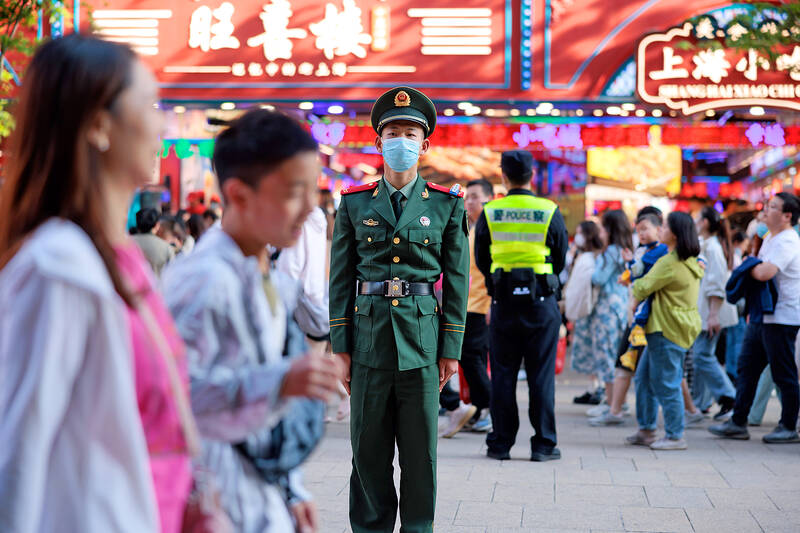China is increasingly barring people from leaving the country, including foreign executives, a jarring message as the authorities say the country is open for business after three years of tight COVID-19 restrictions.
Scores of Chinese and foreigners have been ensnared by exit bans, according to a new report by the rights group Safeguard Defenders, while a Reuters analysis has found an apparent surge of court cases involving such bans in recent years, and foreign business lobbies are voicing concern about the trend.
“Since [Chinese President] Xi Jinping (習近平) took power in 2012, China has expanded the legal landscape for exit bans and increasingly used them, sometimes outside legal justification,” the Safeguard Defenders report reads.

Photo: EPA-EFE
“Between 2018 and July of this year, no less than five new or amended [Chinese] laws provide for the use of exit bans, for a total today of 15 laws,” said Laura Harth, the group’s campaign director.
The group estimated “tens of thousands” of Chinese are banned from exit at any one time.
It also cited an academic paper by Chris Carr and Jack Wroldsen published last year that found 128 cases of foreigners being banned from leaving the country between 1995 and 2019, including 29 Americans and 44 Canadians.
Attention on the exit bans comes as China-US tensions have risen over trade and security disputes. This contrasts with China’s message that it is opening up to overseas investment and travel, emerging from the isolation of some of the world’s tightest COVID-19 curbs.
The Reuters analysis of records on exit bans, from China’s Supreme Court database, shows an eight-fold increase in cases mentioning bans between 2016 and last year.
China last week beefed up its counterespionage law, allowing exit bans to be imposed on anyone, Chinese or foreign, who is under investigation.
Most of the cases in the database referring to exit bans are civil, not criminal. Reuters did not find any involving foreigners or politically sensitive subversion or national security issues.
By comparison, the US and the EU impose travel bans on some criminal suspects, but generally not for civil claims.
The Chinese Ministry of Public Security did not respond to requests for comment on exit bans, including inquiries on how many individuals, including foreigners, are subject to them.
One person prevented from leaving China this year is a Singaporean executive at the US due-diligence firm Mintz Group, three people familiar with the matter said.
The company, the executive and the Chinese Public Security Bureau did not respond to requests for comment.
Mintz said in late March that the authorities had raided the firm’s China office and detained five local staff.
The Chinese Ministry of Foreign Affairs at the time said that Mintz was suspected of engaging in unlawful business operations.
Police visited Bain & Co’s office in Shanghai and questioned staff, the US management consultancy said last week.
“Because of rising tensions between the US and China, the salience of this [exit ban] risk has risen,” said Lester Ross, a veteran lawyer in China who has handled exit ban cases.
“I’ve seen a rise in companies and entities being concerned about this and asking for our advice on how to prepare and reduce risks” of exit bans, said Ross, the head of the American Chamber of Commerce’s China policy committee.
Foreign businesses are concerned about the heightened scrutiny and the vague wording of the counterespionage legislation, which says exit bans can be imposed on those who cause “harm to the national security or significant damage to national interests.”
“The uncertainty is huge,” said Jorg Wuttke, head of the EU Chamber of Commerce in China. “Can you do due diligence? Clarity has to come.”
The EU chamber told Reuters in a statement: “At a time when China is proactively trying to restore business confidence to attract foreign investment, the exit bans send a very mixed signal.”
People barred from leaving China include regular Chinese embroiled in financial disputes as well as rights defenders, advocates and lawyers, and ethnic minorities such as Uighurs in China’s northwestern Xinjiang region, according to the Safeguard Defenders report.
It cites a Chinese judicial report saying that 34,000 people were placed under exit bans between 2016 and 2018 for owing money, a 55 percent rise from the same period three years earlier.
Some advocates say the wider use of exit bans reflects tighter security measures under Xi.
“They can find any reason to stop you from leaving the country,” said Li Xiang (李翔), a Chinese rights advocate who was denied exit for two years before escaping from China in 2017 and later receiving asylum in the US.
“China doesn’t have the rule of law,” she told by telephone from California. “The law is used to serve the purposes of the Chinese Communist Party. It’s very effective.”

‘IN A DIFFERENT PLACE’: The envoy first visited Shanghai, where he attended a Chinese basketball playoff match, and is to meet top officials in Beijing tomorrow US Secretary of State Antony Blinken yesterday arrived in China on his second visit in a year as the US ramps up pressure on its rival over its support for Russia while also seeking to manage tensions with Beijing. The US diplomat tomorrow is to meet China’s top brass in Beijing, where he is also expected to plead for restraint as Taiwan inaugurates president-elect William Lai (賴清德), and to raise US concerns on Chinese trade practices. However, Blinken is also seeking to stabilize ties, with tensions between the world’s two largest economies easing since his previous visit in June last year. At the

Beijing is continuing to commit genocide and crimes against humanity against Uyghurs and other Muslim minorities in its western Xinjiang province, U.S. Secretary of State Antony Blinken said in a report published on Monday, ahead of his planned visit to China this week. The State Department’s annual human rights report, which documents abuses recorded all over the world during the previous calendar year, repeated language from previous years on the treatment of Muslims in Xinjiang, but the publication raises the issue ahead of delicate talks, including on the war in Ukraine and global trade, between the top U.S. diplomat and Chinese

RIVER TRAGEDY: Local fishers and residents helped rescue people after the vessel capsized, while motorbike taxis evacuated some of the injured At least 58 people going to a funeral died after their overloaded river boat capsized in the Central African Republic’s (CAR) capital, Bangui, the head of civil protection said on Saturday. “We were able to extract 58 lifeless bodies,” Thomas Djimasse told Radio Guira. “We don’t know the total number of people who are underwater. According to witnesses and videos on social media, the wooden boat was carrying more than 300 people — some standing and others perched on wooden structures — when it sank on the Mpoko River on Friday. The vessel was heading to the funeral of a village chief in

REGIONAL TENSIONS: China boosted spending on its military for the 29th straight year, raising it by 6% to US$296bn, while Taiwan spent US$16.6bn, an 11% increase Global military expenditure recorded its steepest increase in over a decade last year, reaching an all-time high of US$2.4 trillion as wars and rising tensions fueled spending across the world, researchers said yesterday. Military spending rose across the globe with particularly large increases in Europe, the Middle East and Asia, according to a new report by the Stockholm International Peace Research Institute (SIPRI). “Total military spending is at an all-time high ... and for the first time since 2009, we saw spending increase across all five geographical regions,” SIPRI senior researcher Nan Tian said. Military spending rose by 6.8 percent last year, the